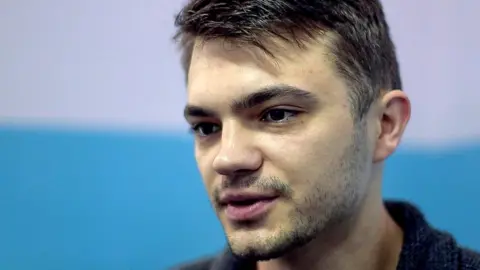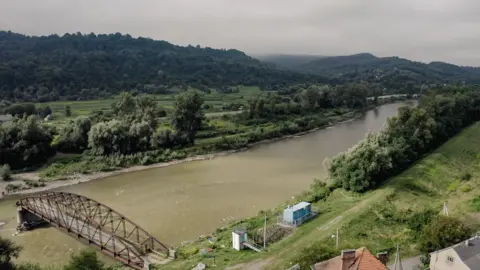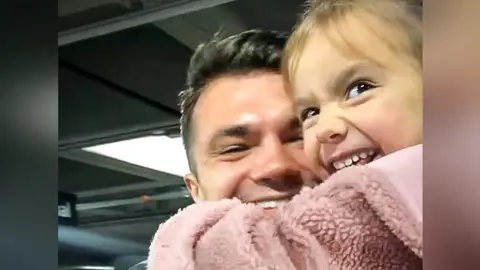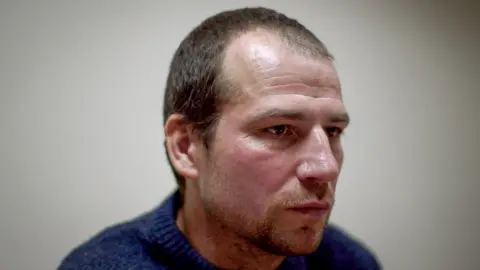Swimming rivers and faking illness to escape Ukraine’s draft
 BBC
BBCNearly 20,000 men have fled Ukraine since the beginning of the war to avoid being drafted, the BBC has discovered.
Some have swum dangerous rivers to leave the country. Others have simply walked out under cover of darkness.
Another 21,113 men attempted to flee but were caught by the Ukrainian authorities, Kyiv confirmed.
After Russia's invasion, most men aged 18-60 were banned from leaving. But data obtained by the BBC reveals dozens have made it out daily.
We have spoken to several men who have escaped in order to join family abroad, study, or simply make a living.
"What am I supposed to do [in Ukraine]?" one man, Yevgeny, said. "Not everyone is a warrior… you don't need to keep the whole country locked up. You can't lump everyone together like they did in the Soviet Union."
The BBC has established - by requesting data of illegal border crossings from neighbouring Romania, Moldova, Poland, Hungary and Slovakia - that 19,740 men illegally crossed into these countries between February 2022 and 31 August 2023.
While we do not know how those men escaped, we do know what methods were used by the other 21,113 who were caught trying. The majority - 14,313 - were attempting to walk or swim across the border, and the remaining 6,800 relied on fraudulently obtained official paperwork stating fake exemptions such as fabricated illnesses, the Ukrainian authorities said.
Those who are excluded from conscription include men with medical issues, those with caring responsibilities, and fathers to three or more children.
In August, Ukrainian President Volodymyr Zelensky called out the "corrupt decisions" made by the country's medical military commissions, which he said had resulted in a ten-fold increase in exemptions since February 2022. He announced that all regional officials in charge of military conscription had been removed, and more than 30 people faced criminal charges.
The president's parliamentary representative, Fedir Venislavskyi, acknowledged to the BBC that the problem was serious.
"The government realises that this phenomenon is not isolated and that it is widespread. But unfortunately, I would emphasise that corruption is very resilient," he said - adding that Ukraine was doing "everything possible to keep the number of corruption cases to a minimum".
Mr Venislavskyi said the number of men who had left or had tried to leave was having no impact on the war effort.
"I am convinced that the resilience and readiness of Ukrainians to defend their independence, sovereignty and freedom is 95-99%," Mr Venislavskyi told the BBC.
"Those who try to avoid mobilisation are about 1-5%. They are definitely not critical to the defence of Ukraine." He said there were no plans to radically increase the number of those eligible for mobilisation.

The 40,000-plus number of men who have fled, or tried to flee, could represent a significant proportion of the men Ukraine needs to replenish its army. In August, US officials estimated the Ukrainian military death toll to be up to 70,000 - although Kyiv won't give a figure.
The country also does not release official figures on the size of its army. But the new Defence Minister, Rustem Umerov, told the Yalta European Strategy forum in September that there are more than 800,000 in the Ukrainian armed forces.
Some of the escapes have been dramatic.
One video shows a man swimming across the Dniester River towards Moldova, with Moldovan border guards urging him across to safety. Another shows the potentially fatal consequences - bodies of men being pulled ashore, having drowned trying to cross the Tisa River between Ukraine and Romania.
But Yevgeny, a construction worker from Kyiv who we met in a Moldovan immigration centre, said he simply walked across that country's border - the most popular route out, our figures suggest. It is then relatively straightforward for escapees of the war to claim asylum.
Yevgeny had felt trapped in Ukraine he told us - younger men and those with military experience had been called up for conscription first.
It had been difficult for him in the meantime to find a well-paying job, "because everything is geared towards the war" and yet "electricity, fuel - everything's become more expensive".
After being processed by the Moldovan police, he applied for asylum - something that must be done within 24 hours of entering the country to avoid a criminal record.

Thousands of Ukrainian men have joined the call to fight for their country since Russia's invasion in February last year. But what of those who decided military service was not for them?
Watch now on BBC iPlayer (UK Only) or YouTube

It was at the same asylum and immigration centre that we met Erik, a 26-year-old musician from Kharkiv, who says he crossed over to Moldova by walking across the plains of Moldova's breakaway Transnistria region and then swimming across a river.
While fake exemptions may be possible to get hold of, Erik's experience suggests genuine paperwork may prove more difficult to get.
Following complex abdominal surgery for peritonitis when he was younger, Erik says he needs to follow a special diet which precludes him from serving in the army. But he says when war broke out it proved impossible to get a medical exemption certificate.
"They pass the responsibility from one department to another: 'Go here, go there.' I spent half a year trying to get a certificate [to prove] that I was unfit, despite having all the tests in my hands. Eventually my patience ran out."
Erik eventually made it to the US, where he was reunited with his wife and their four-year-old daughter.
 Supplied
SuppliedAnother man, who we are calling Vlad, did manage to get hold of a valid exemption - but says he could then not get the border guards to take it seriously.
He says he was excited to have been accepted on a foreign university course, and had been granted a student permit to leave Ukraine, but soon realised that this was not going to suffice.
"I thought it didn't work out because I got a tricky checkpoint. I went to another one, and another one. They laughed at me and sent me home. I realised that this piece of paper - this 'permission' - is pointless for a border officer, they don't care at all."
Instead Vlad left the country by swimming across the Tisa River into Romania.

Vlad reached the Ukrainian side of the border with the help of a friend, but another man, who we are calling Danilo, says he used the services of someone via Telegram who was organising a crossing of the Tisa.
The messaging app is a popular platform for smugglers to advertise their services, the BBC has established. An undercover reporter working for our investigation, who we are calling Andrey, spent a month corresponding with smugglers, posing as a Ukrainian keen to leave the country.
He discovered at least six Telegram groups - with membership ranging from 100 to several thousand people. He says they offered a range of services, from adding pretend children to his family, to the most expensive option - the medical exemption certificate, known as the "white ticket" which would allow him to leave and return to Ukraine whenever he liked.
He was told it would take up to a week to make, and would cost him about $4,300 (£3,472) - the price included a bribe to the official making the ticket.
Parliamentary representative Mr Venislavskyi told us that the threat posed by fake documentation - and the difficulties in some cases of obtaining real paperwork that is taken seriously by border guards - should be eradicated within the next year or two by a new digitised system.
All those we spoke to had been successful in their attempts to leave the country, but those who are caught by the Ukrainian authorities risk a fine of $92-230, and a prison sentence of up to eight years.
It isn't clear whether those who flee and choose to return to Ukraine in the future might also face retrospective punishment, but Mr Venislavskyi said he didn't believe that would be in the national interest.
Danilo argued that Ukrainians should be allowed to make their own decisions.
"Because I still believe that each person chooses their life's purpose. For some, the meaning is in defending their territories, for others, it's about protecting themselves and their families. Some want to create, build businesses, contribute to the state's economy.
"I believe that no matter what, my role isn't on the battlefield.
He said he hoped that the Ukrainian authorities would encourage those who have left to return when the war ends, rather than punish them.
"Without people - moreover without smart people who earn good money and pay good money to the treasury - it is harder for the state to exist."
With no end in sight to the war with Russia, it is not clear when that issue will become relevant. In the meantime, as this turns into a war of attrition, Ukraine needs all the soldiers it can get.
